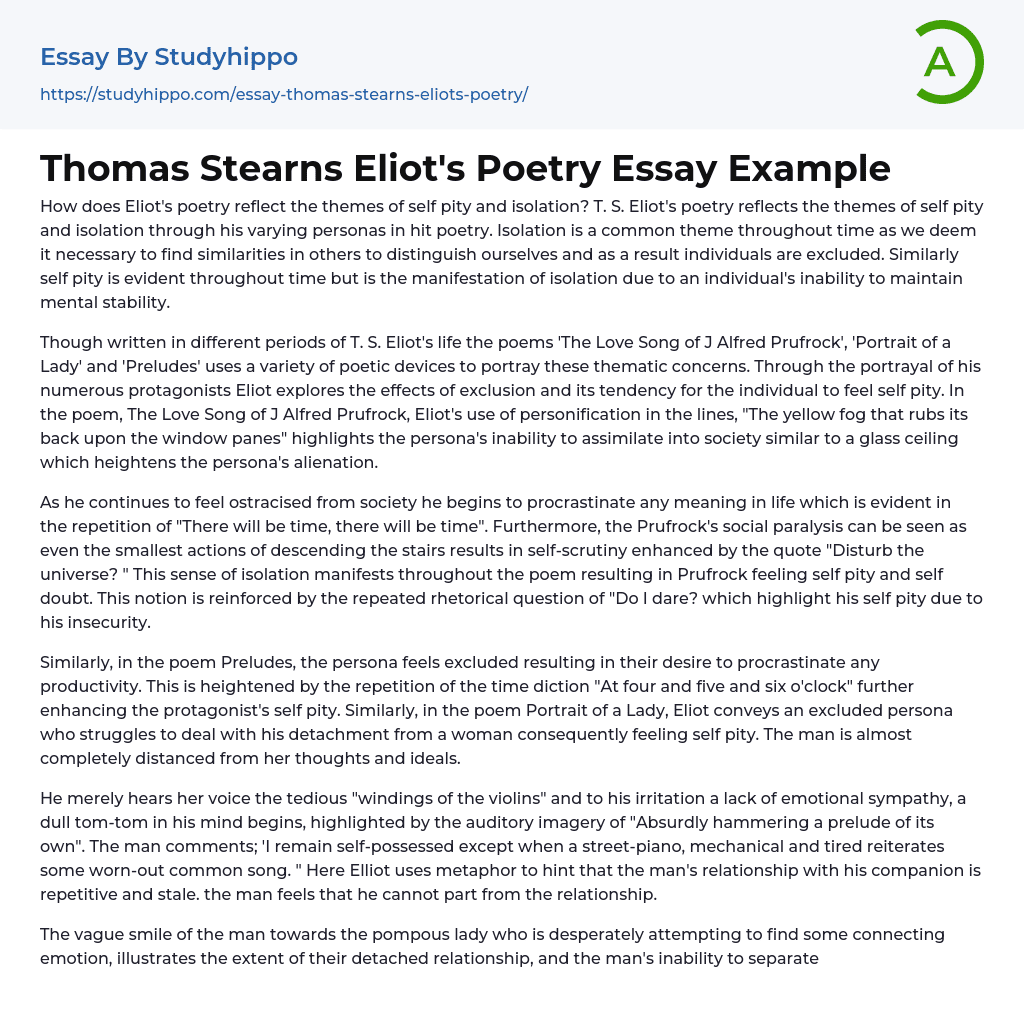What does Eliot's verse illustrate about self-regret and isolation? T. S. Eliot's poems often underline these themes, featuring characters grappling with feelings of self-reproach and seclusion in his acclaimed works. Historical narratives frequently present the theme of alienation, driven by our innate need to connect with others and establish our sense of self, which sometimes results in solitude. Likewise, the motif of self-sympathy recurs often, typically emerging from loneliness and a person's struggle to maintain mental balance.
T. S. Eliot's poems, such as 'The Love Song of J Alfred Prufrock', 'Portrait of a Lady,' and 'Preludes' were penned at different times in his life, yet they all employ a variety of poetic devices to express their central themes. Through the characters depicted in these works, Eliot explores the effects of social isolation and the resu
...ltant feelings of self-pity it breeds among individuals. For instance, he employs personification in 'The Love Song of J Alfred Prufrock', with the line "The yellow fog that rubs its back upon the window panes", accentuating the protagonist's struggle to integrate into society - metaphorically portrayed as a glass ceiling - thus amplifying his sense of loneliness.
The increasing sense of alienation felt by Prufrock triggers him to ponder the meaning of life, as manifested in the recurrent phrase "There will be time, there will be time." His difficulties with social interactions are clear; even basic actions like descending stairs provoke self-examination, underscored by his query, "Disturb the universe?". This sentiment of solitude permeates through the whole poem and guides Prufrock on a journey filled with self-questioning and self-compassion. His lack of confidence augments this self-pity which
is further amplified by his regular rhetorical question "Do I dare?".
In the poem Preludes, the main character experiences a sense of isolation which prompts them to defer any creative output. The recurring time cues "At four and five and six o'clock" intensify the protagonist's self-doubt. In a similar vein, in the poem Portrait of a Lady, Eliot portrays an outcast persona who grapples with his disconnection from a woman leading to a deep sense of self-reproach. The man is nearly entirely estranged from her thoughts and ideals.
His sole activity is listening to her speak, encapsulated by the metaphor of "violin's windings," which exacerbates due to a lack of emotional rapport and forms an irritating, repetitious rhythm in his mind, entranced by the aural image of "Preposterously pounding out its own prelude." The man notes; 'I can sustain my calm until a tired, automated street piano reiterates some hackneyed tune.' Here Elliot uses metaphor subtly implying that the man's association with his partner is tedious and uninspiring. He feels trapped, finding it hard to escape this relationship.
The man's ambiguous smile towards the pretentious woman who is frantically seeking some shared emotional connection elucidates the degree of their disconnected relationship, as well as his inability to entirely extricate himself from her. Upon reviewing this, it's clear that T. S. Eliot artfully depicted the theme of isolation, leading to a feeling of self-pity in an individual, through his utilisation of various poetic techniques. This theme is similarly and distinctively conveyed in his poems 'The Love Song of J Alfred Prufrock', 'Portrait of a Lady' and 'Preludes'.
- Adoption essays
- Aunt essays
- Babies essays
- Bedroom essays
- Caring essays
- Children essays
- Daughter essays
- Divorce essays
- Dog essays
- Dysfunctional Family essays
- Family Tradition essays
- Family Values essays
- Father essays
- Foster Care essays
- Friends essays
- Grandparent essays
- Home essays
- Hometown essays
- Husband essays
- Jealousy essays
- Love essays
- Marriage essays
- Mother essays
- Online Dating essays
- Parenting essays
- Parenting Teens essays
- Parents essays
- Relationship essays
- Room essays
- Sibling essays
- Sister essays
- Wedding essays
- Wife essays
- Allegory essays
- Alliteration essays
- Comedy essays
- Comic book essays
- Drama essays
- Dystopia essays
- Fairy Tale essays
- Fantasy essays
- Fiction essays
- Ghost essays
- Gothic Fiction essays
- Gothic Literature essays
- Irony essays
- Legend essays
- Memoir essays
- Novel essays
- Poetry essays




